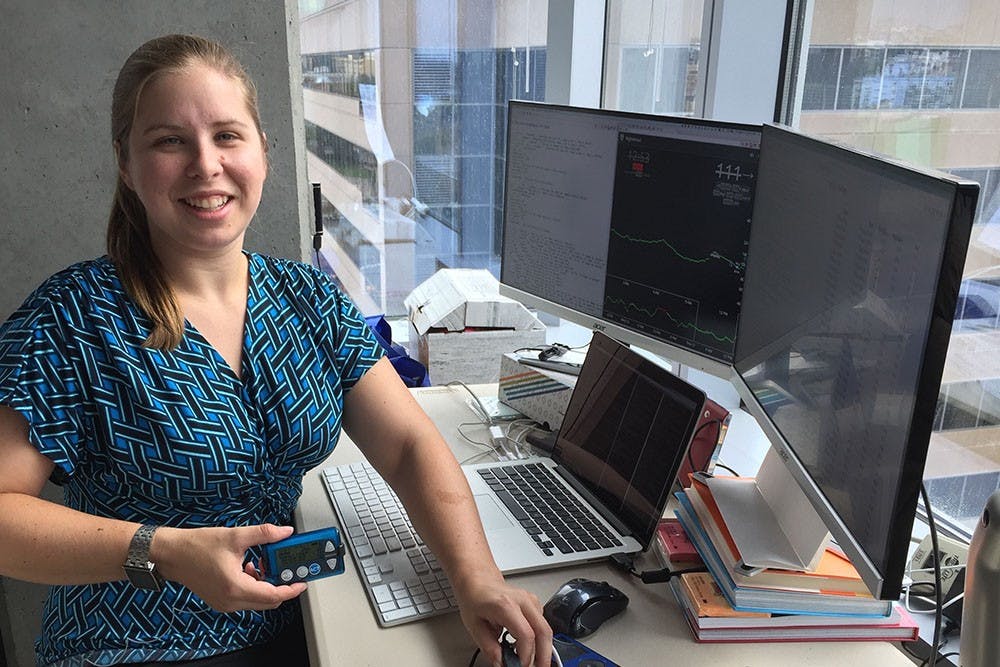Citizen science is a movement started by members of the general public who are either passionate about science or unsatisfied with the progress being made in a scientific field.
Dana Lewis, for example, helped found OpenAPS.org, an online community allowing Type 1 diabetes patients to build a personalized artificial pancreas system using off-the-shelf medical equipment and an open-source code provided by the website.
By collaborating with ASU researchers, Lewis’ work is now being funded by a grant of approximately $500, 000 from the Robert Wood Johnson Foundation, administered by the ASU Foundation.
Eric Hekler, a professor at the ASU School of Nutrition and Health, was approached by Lewis about collaborating with academia to further her work.
“It was really inspiring to see what she fought through," Hekler said. "Her work challenges the notion of ... the role of a person going through those issues. She found a way to help herself using the scientific method."
Lewis is a Type 1 diabetes patient herself. Her educational background is in communications, so she has no formal engineering or medical training. However, her dissatisfaction with the Type 1 diabetes treatments available motivated her to take matters into her own hands.
She started by increasing the volume on her continuous glucose monitoring device because she could not hear the alerts indicating that her glucose levels were low. While this might seem like a small problem, it can be a life threatening situation for a Type 1 diabetes patient.
After extensive work, Lewis built a hybrid closed-loop artificial pancreas which automatically adjusts the levels of glucose in the body. She did this years before this technology became commercially available.
The online community she helped found provides instructions on how to use off-the-shelf components and the open-source code needed to create a system that is more personalized than anything currently available in the market.
“Citizen science is an interesting term," Lewis said. "It’s based on individuals doing scientific research and discovery in areas that previously have only been investigated by professionals. It’s important because we now have technology that allows us to better build tools and solutions that work well for us as individuals.”
Many devices and solutions developed by the healthcare industry so far use a one-size-fits-all approach.
“This means they can’t always be customized and don’t always work well for everyone,” Lewis said.
By using readily available technology and networking through social media, people like Lewis have been able to develop technology that fits the individual needs of Type 1 diabetes patients.
“Companies develop treatments for the average patient," Hekler said. "There is a bias towards what’s generally useful. The problem is that nobody is average."
The efforts of people like Lewis are not geared toward excluding medical experts and the healthcare industry, however. They are meant to contribute to the progress of healthcare.
“It doesn’t exclude companies," Hekler said. "(Lewis) wouldn’t have been able to build her system without the development of companies. It brings up questions that the experts might overlook."
Erik Johnston, a professor at the ASU School for the Future of Innovation in Society said the role of the ASU collaborators is to follow her lead and help her connect with the academic community.
“What academia could do is increase the likelihood that other communities can find the same level of success as (Lewis) did,” Johnston said.
The work of citizen scientists like Lewis is giving patients a voice and allowing them to influence the development of their treatments.
“In the expert-driven model, people with resources invent something, test it and make a tremendous amount of money on it," Johnston said. "This flips that model on its head by saying more people can be involved in the innovation process and create something that meets their communities, their families or their own needs."
Lewis is scheduled to speak at ASU’s McCord Hall on Oct. 16 about her work and the impact it has on the culture of healthcare innovation, research and design.
Reach the reporter at cazares429@gmail.com or follow @sonic_429 on Twitter.
Like State Press on Facebook and follow @statepress on Twitter.




